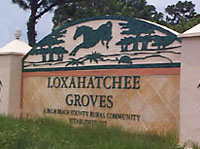The Loxahatchee Groves Town Council voted unanimously Tuesday, Aug. 6 to require that parking lot lights go out at 11 p.m. at commercial developments in the community.
The decision at this week’s council meeting followed a discussion at a meeting of the town’s Uniform Land Development Committee, which ended in a 2-2 impasse.
Planning Consultant Jim Fleischmann said the committee has been working through the code and recommended approval of all revisions except for outdoor lighting, on which they were split on whether lights should go off at 11 p.m. or be allowed to use dimmers.
“Under the current code… open-air parking shall be controlled by automatic devices that cause lighting to be closed, shut down between 11 o’clock and dawn. So, right now, the code says that outdoor lighting — that is parking lot lighting — has to be shut down between 11 p.m. and dawn,” Fleischmann said. “The committee voted 2-2 on that. Two members wanted that language retained, and there were two members in favor of staff’s recommendation to require that automatic devices be installed, but that those automatic devices be used to regulate lighting between 11 p.m. and dawn so that the overspill requirement is maintained.”
Fleischmann brought the item to the council to break the tie.
Councilwoman Phillis Maniglia preferred to allow parking lot lighting after 11 p.m. “I don’t believe any place should have no lighting whatsoever after 11 o’clock,” she said. “I think the issue was they wanted it dark in a commercial parking lot. I disagree with that.”
Mayor Robert Shorr said he agreed that there should be some lighting in commercial parking lots, adding that current lighting technology allows for dimmed lights that will not spill over into nearby residential neighborhoods.
Councilwoman Lisa El-Ramey said there will be sufficient lighting on the buildings themselves to illuminate the area for late-night customers.
“The light pollution that we’re going to be encountering as we move forward with all the development around us, we should control what’s within our boundaries in a much heavier way, so I disagree,” El-Ramey said.
During public comment, Casey Suchy, a member of the Unified Land Development Committee, said the parking lot lights should go out at 11 p.m.
“This is for developments under 20 acres because the developments over 20 acres can go for waivers to correct the lighting,” Suchy said. “We need to take into account the lifestyle of the people who live here. Are we going to have commercial development drive our town and determine what lifestyle these people have, or are we going to let the town drive what the people want based on our lifestyle? It’s not what’s happening in the parking lot, you’ve got to think about all the developments and the projects that are going in, and they’re going to be lighting up all these areas.”
Fleischmann said that the way the code is written, there is flexibility so that if there is lighting overspill, it can be corrected with the automatic devices.
“Businesses that want to stay open beyond 11 p.m. want to be able to have the appearance that the business is open,” he said. “Keep in mind, this is six-lane Southern Blvd. we’re talking about.”
“We don’t want it to look like Military Trail,” Maniglia replied.
Roadways, Equestrian, Trails & Greenway Advisory Committee Member Nina Corning said the code will affect all of the town.
“You’re writing this in the entire code,” Corning said. “What Southern Blvd. will do, Southern Blvd. will do, but Southern Blvd. and it creeping in is a whole other subject, and it is a nuisance, not if it becomes a nuisance. It is a nuisance. I can remind you of all the people standing up who were opposed to all of this development out west here, and one of the biggest things that they brought up was light pollution. This is light pollution. This is loss of night sky. This is going to bother the animals, the people, you name it. You are not here to serve Wawa. You are here to serve the citizens of this town.”
Shorr reminded council members that there is a way for developers to request a variance to the code.
“I appreciate the comments, and from that perspective, understand this is not a commercial code, this is the lighting code for the entire town,” he said.
Fleischmann said there is an alternative provision that allows the town to look at individual properties.
“We allow a waiver in the PUD ordinance, and that’s how the Wawa got its waiver, but the Wawa did not abut any residential properties, and it demonstrated through its photometric plan that it was not going to have overspill on adjacent properties,” he said. “That’s really the definition of a nuisance in our code, is overspill onto adjacent properties.”
El-Ramey pointed out that the town has overspill from the stadium lights at nearby Seminole Ridge High School.
“It lights up like the sun is going down,” she said. “If you want to talk about this on an individual basis, I’m opposed to this lighting, seriously.”
Shorr said he is all for lighting for public safety at certain facilities, but the code is written for the entire town. “If they have to ask for a variance, there’s avenues for a variance,” he said.
Councilman Dave DeMarois made a motion that the lights go out except at locations where the council grants a variance, which carried 5-0.








